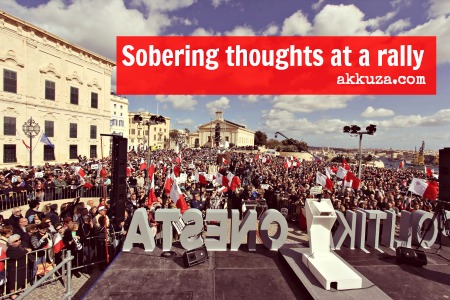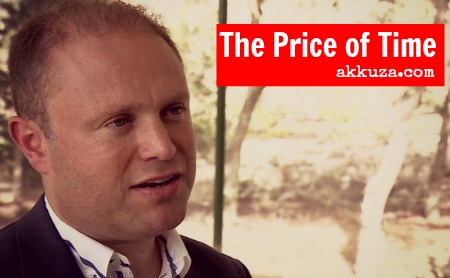The Panama Papers affair is bigger than Malta. Much much bigger. The data leaked from the offices of Mossack Fonseca covers decades of information and has an effect on people worldwide. Rich people worldwide. The social and political effects are only just beginning to snowball and the high profile case of the Icelandic Prime Minister will surely not be the last by far. There is much that is surreal about this business including the fact that many seem to be surprised about the goings on in a tax haven state like Panama (and not just Panama). The informed citizen of today still has the capability of striking you as being somewhat naive about the truths of the world. It’s OK to watch your James Bond and Mission Impossible movies or read international espionage novels were money is ‘wired’ away at the touch of a button into secret impregnable accounts on the other side of the world but then it is suddenly surprising to find out that fiction has been mirroring reality all along and that foremost among the crooks are a band of money-crazy politicians.
The world wakes up once again (for the nth time) to the reality that the real conmen are those who are creaming off the luxurious part of our collective earnings while the normal citizen is being right royally rogered. It would seem that the banking and property bubbles were not enough and that just as we were beginning to understand the nuances of Hollywood’s The Wolf of Wall Street and The Big Short we were supplied with enough new stories to merit a marathon of docu-flicks. It’s a world-wide issue – from Brasil to New Zealand to Panama to Malta questions are being asked of a political class that has been caught short one time too many. Which brings me to Sunday’s national(ist) protest. I’d like to share some notes and thoughts that were inspired by the rally – before, during and after it happened. Here goes:
- Panamagate has brought Malta to yet another important cross-roads of its political history. These litmus tests have been scattered over our relatively short life-span as a sovereign nature. to Once the consequences of certain decisions are calculated, once the effects are factored in and once a new beginning has been undertaken, history will show that there was a “right” and “wrong” side to the current events (with all the concessions that we can make to the subjective nature of such interpretations). There was an appeal to that feeling mostly by Marlene Farrugia with her battle cry (or shriek) of “Hawn jien” (Here I am) – emphasising that this moment is one of those times that people stand up and be counted. (Also emphasising rather ironically the obsession with “Fejn kont?” (Where were you?) that afflicts political debates that put much value into unswerving loyalty to beliefs – also known as the tal-Barrani Syndrome). Citizens have begun to understand the consequences of a lax polity that has no sense of merit, no intention of accountability and no respect for the common good. Those citizens are being called in action to halt the slide to mediocrity of politics. If for nothing else, Panamagate is serving as a huge eye opener.
- Maltin Onesti. Maltin li jhallsu t-taxxi. The rally was inevitably tinged with a partisan flavour. The call of the party is difficult to suppress and Carmelo Mifsud Bonnici’s words flow through the veins of many who were eager to rekindle an enthusiasm that had for so long been dormant if not absent. Ejjew nazzjonalisti, ejjew bil-bnadar taghkom, ejjew bl-eluf minn taghkom, f’dis-siegha tat-taqbid. To be fair the effort to de-party the event was all there. The only flags to be seen were the red and white of Malta and the only hymn to be heard other than that posion for the ears that goes “We the people” was the national anthem right before the Leader of the Opposition spoke. So far so good. What jarred ever so slightly were those calls for honest tax-paying Maltese that seemed to be an appeal to create a dichotomy between good and evil that is ever so present in our political discourse. The greatest risk was that this self-arrogation of purity and righteousness would distract from the real message. After all there was no need to set such a high standard for the crowd – it is not the moral and righteous standard of individual citizens that is being questioned here but the dealings of a minister of government, the PM’s chief of staff and the PM himself by vicarious responsibility (until now). It is not the case of “he who is pure throw the first stone” – that is the wrong lesson to impart to the crowd. This is all about accountability in a normal liberal democracy where the people, taxpayers and all, have the right to call for the dismissal of a Minister caught in circumstances such as Mizzi’s.
- That is really the point of it all isn’t it? There is a sense of inevitability about the fact that Mizzi and Schembri will eventually resign. That sense of inevitability is inspired by the simple reason that their position became untenable from the moment that they chose to set up a financial structure as has been discovered. There is no need to find money or treasures, no need for tax audits, no need for declarations, no need for any of all this. The mere fact that they thought of using a structure that can only exist to keep something hidden (whether in the past or in the future) is enough to make them unfit for any purpose that requires public trust. Our Prime Minister knows that his position only gets worse every day that he does not take action on the matter – and when I say worse I do not only mean among those who attended the national protest but also, as is becoming increasingly obvious, among his own supporters.
- There is a reflection that is hard for the nationalist party to swallow. It must be made. We did not get to the national protest on April 10th thanks to anything that the nationalist party has done. The huge mass of people calling for the ousting of Mizzi and Schembri (and Muscat) were there because of a much bigger series of events that began when somebody signing off as John Doe offered to pass on a huge amount of sensitive information to a journalist working for the Süddeutsche Zeitung. The Panama Papers have exposed the inadequacy of key members of our government and to this day threaten the very existence of the government itself. What about the PN? The PN was already on the road to recovery – its proposals on Good Governance in less suspicious times were a good start. It could not but try to take the lead on this matter and as a responsible opposition it is pressing for immediate action. In doing so it must be wary of sensationalism and of the trap of falling into the old political game. The people are fed up with politicians trying to take them for a ride. In 2013 the people handed Muscat an incredible majority exactly because they felt they could no longer take the arrogance of the nationalist government of the time. Questioning their choice today becomes a futile exercise if what is offered as an alternative to the current mess is more of the same.
- The main lesson to be drawn here is that the nationalist party must brush up its act if it is preparing to lead with New Politics. New Politics means not being drawn into the partisan mud-slinging game by Labour’s diversion tactics. It also means building up on ideas and strengthening the values it represents by showing that it is a party with a national interest at heart and not a self-serving machine of the kind that is now anathema to most voters. To prepare for this it must already think beyond Panamagate because if the events ahead are truly inevitable and foreseeable then the PN must be prepared with a project of its own and also be prepared to listen to those who for too long have been sent to the margins of politics and who have ideas of real reform that could revolutionise the landscape. Yes, the PN might have to be prepared to become a smaller but stronger part of a renewed political landscape.
- As for Labour. Labour was not present at the national protest. We were regaled with a national conference brimming with Soviet Style optimism and standing ovations. Konrad Mizzi was one step short from being awarded the Soldier of Steel Medal (but that is usually awarded AFTER you lose your place) and his failure to bear responsibility angered quite a few of the Labour delegates and MPs. This turmoil is just the beginning for the labour party. The Taghna Lkoll philosophy has failed and not just because of Panamagate. Panamagate served as an eye opener to uncover the many things that Labour has been allowed to get away with until now. Ahead lie battles for the soul of the party and do not expect the current power circle to let go lightly – there are too many interests involved. There will be blood – of the political kind as Chris Cardona would say.
- One last word on the media. The nationalist party committed a horrible faux pas by conflating the Jason Azzopardi libel case. The crowd outside the law courts was a throwback to the medieval era, that same medieval era where Chris Cardona’s rhetoric belongs. Doorstepping irritating journalists aside there is something extremely worrying about the state TV’s reluctance to properly report the daily changes in Panamagate. Also worrying where the calls from the Labour corner of the crowd to somehow stifle any international coverage or reporting of the situation. It would seem that there are still exponents who rue the absence of a law on foreign interference – even Chris Scicluna was targeted for sending a factual report to Reuters about the national protest.
I’ll stop here for now. We’ve got weeks ahead of more exchanges and more information to discover. We are definitely living in interesting times.









